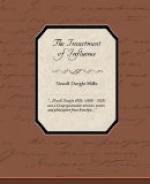In all His relations with His friends and enemies the quality that crowns His method of living and challenges our thought is the gentleness of His bearing. Matchless the mingled strength and beauty of His life, yet gentleness was the flower and fruitage of it all. For in Him the lion and the lamb dwelt together. Oak and rock were there, and also vine and flower. Weakness is always rough. Only giants can be gentle. Tenderness is an inflection of strength. No error can be greater than to suppose that gentleness is mere absence of vigor. Weakness totters and tugs at its burden. When the dwarf that attended Ivanhoe at the tournament lifted the bleeding sufferer he staggered under his heavy burden. Weakness made him stumble and caused the wounded knight intense pain. When the giant of the brawny arm and the unconquered heart came, he lifted the unconscious sufferer like a feather’s weight and without a jar bore him away to a secure hiding-place for healing and recovering. He who studies the great men of yesterday will find in the last analysis that gentleness has always been the test of gianthood, and fine considerateness the measure of manhood and the gauge of personal worth. No other hero moving through the crowds has ever been so courteously gentle, so sweetly considerate in his personal bearing as this Christ—who never failed to kindle in men transports of delight and enthusiasm.
The crying fault of our generation is its lack of gentleness. Our age is harsh when it judges, brutal when it blames and savage in its severity. Carlyle, emptying vials of scorn upon the people of England, numbering his generation by “thirty millions, mostly fools,” is typical of the publicists, authors and critics who pelt their brother man with contemptuous scorn. The author of “Robert Elsmere” exhibits that polished scholar and brilliant student as one who gave up teaching because he could find no audience on a level with his ability or worthy of his instruction. Having begun by despising others, he ends by despising himself. Now the popularity of Elsmere’s character witnesses to the fact that our generation includes a large number of cynics who scorn their fellows and in Elsmere see themselves as “in an open glass.” To-day this tendency toward harshness of judgment has become more pronounced, and there seems to be no leader so noble as to escape brutal criticism and no movement whose white flag may not be smirched by mud-slingers. What epithets are hurled at each new idea! What torrents of ridicule are emptied out upon each social movement!
The fact that society has oftentimes destroyed its noblest geniuses avails little for the restraint of harshness. For years England was wildly merry at Turner’s expense. The newspapers cartooned his paintings. Reviews spoke of them as “color blotches.” The rich over their champagne made merry at the great artist’s expense. After a while men found a little respite from the




